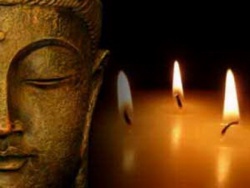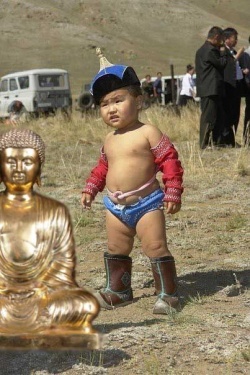Buddhism: Metaphysics
An Essay By Hannah D. // 9/26/2013
Although there are many differences in the metaphysics of Theravada and Mahayana, Buddha was not devoid of such opinions himself. Buddhist philosophy begins with nirvana, the end of enlightenment. It translates as ‘to blow out’ or ‘to extinguish,’ and that can call into question exactly what kind of religion promises its followers that this is their reward for devotion. But the idea of total nonexistence is connected to self-awareness and infinite being.
“Deprived of fuel, the fire goes out, and this is nirvana . . . we must be precise as to what is to be extinguished. It is the boundaries of the finite self. It does not follow that what is left will be nothing . . . It is boundless life itself.” (113)
When an enlightened Buddhist has achieved nirvana, then, when he dies he will be released from his finitude and into the infinite – impossible to describe, perhaps, but that is to be expected, for as Buddha taught, “after we eliminate every aspect of the only consciousness we have ever known, how can we speak of what is left?” (113)
To the Mahayanist, nirvana may be seen as God. It is an impersonal force, but it is infinite, good, peaceful, and Truth and Reality itself. But it is not a creator, nor is it personal or graceful towards humans in any way. On the contrary, Theravadans understand that that “If absence of a personal, Creator-God is atheism, Buddhism is atheistic” (114).
This brings Smith to a new question to consider: “Some conclude that since Buddhism professes no God, it cannot be a religion; others, that since Buddhism obviously is a religion, religion doesn’t require God” (114). What is the Christian to believe? Can a religion really profess no faith in God (or faith in no God)? Romans 1:20-21, 25 states:
“For the invisible things of him from the creation of the world are clearly seen, being understood by the things that are made, even his eternal power and Godhead; so that they are without excuse: Because that, when they knew God, they glorified him not as God, neither were thankful; but became vain in their imaginations, and their foolish heart was darkened. Who changed the truth of God into a lie, and worshipped and served the creature before than the Creator, who is blessed forever. Amen.”
What can we gather from these verses? First, that God has revealed Himself to everyone; no one is inexcusable when they say they don’t believe in Him. Second, that by rejecting Him, they turn to the worship of created things rather than Creator. This is not just true of ancient forms of paganism, but equally is true of modern atheism (consider atheist Lawrence Krauss's statement, “Forget Jesus, the stars died for you”) and is certainly true for the autonomous, humanistic thinker such as Buddha and those who follow him. They worship man in general by exalting Mankind as the judge of everything else or may even worship the Buddha. So yes, it is possible to adhere to a godless religion – in fact, it is impossible not to be religious regardless of one’s professed beliefs.
With that settled, and keeping in mind that nirvana can account for both theistic and atheistic Buddhism, it is time to move on to metaphysics. Although Buddha didn’t say much about his views on this subject and largely left his followers to quarrel over them after him, he did hold such views. In fact, Smith makes this refreshing statement:
“[T]he task [of defining Buddhist metaphysics) is unavoidable for the simple reason that metaphysics is unavoidable. Everyone harbors some notions about ultimate questions, and these notions affect interpretations of subsidiary issues.” (113)
Such honesty is admirable! There are quite a few people nowadays who claim to have no such ultimate beliefs, that they are neutral and approach science and religion objectively. The result shows itself to be fallacious when such statements are made as in this quote from an anthropology textbook: that we are to do “objective fieldwork conducted from a relativistic viewpoint” (Bailey and Peoples, 66). Everyone must be subjective to their ultimate standards, and to claim to be otherwise is but a faulty ultimate standard.
Perhaps the most significant aspect of Buddha’s philosophy is his view of the soul. India had strong beliefs in the reincarnation of human souls, and Hinduism’s Atman was considered a distinguished infinite person from the finite self. But Buddha believed in anatta, or ‘no soul.’ There is nothing, he thought, that outlived the body; granted, he accepted some form of reincarnation, but it was more of some “finite desire” (Smith, 117) that passed on than an actual spirit. Like a flame passing from candle to candle, its essence passed from person to person until one of its humans reached nirvana to become a “holy one who has extinguished all such desire” (117). Here he would be released from the constraints of this world. “If increased freedom brings increased being, total freedom should be being itself” (119). In this way, a person who has achieved nirvana has not connected to his Atman but is released from anything connected to earthly life.
“The ultimate destiny of the human spirit is a condition in which all identification with the historical experience of the finite self will disappear, while experience as such not only remains but is heightened beyond all recognition.” (118)
Think about this. The Buddhist tries to bring every sensation and passing thought into notice. In releasing from the finite self - and becoming one with the infinite universe - bringing every thought and sensation into focus means becoming omniscient. It means reaching omnipresence through meditation. Autonomy is a self-deifying worldview, and this further shows how the man who rejects God will worship created things - in this case, himself.
Buddha also believed in Karma, and that “Each life is in its present condition because of the way of the lives that led up to it were lived” (115). But why should such consequences be applied to a life that isn’t a part of continued soul, but only a flicker of “finite desire”?
Another problem with Buddha’s metaphysics was his notion on its unimportance, all the while stressing morality, compassion and helping others. Smith quotes from the Majjhima Nikaya:
“[I]t is not on the view that the world is eternal, that it is finite, that body and soul are distinct, or that the Buddha exists after death, that a religious life depends. Whether these views or their opposite are held, there is still rebirth, there is old age, there is death, and grief, lamentation, suffering, sorrow and despair . . . I have not spoken to these views because they do not conduce to absence of passion, or to tranquility and Nirvana. And what have I explained? Suffering have I explained, the cause of suffering, the destruction of suffering, and the path that leads to the destruction of suffering have I explained. For this is useful.” (Smith, 96)
But are such metaphysical questions really that irrelevant to helping others? Consider the question of life after death. If it really doesn’t matter either way, there is the possibility that people don’t live on after they die. And if that is the case, why bother helping them? They will soon die and be released from their sorrows and forget they ever had them. You will soon die and forget your guilt at not helping them. Why would compassion be necessary if nothing in this life means anything? When teaching others to help people in need, it is important to realize that they will live on and that how they live in this life will affect them forever. Metaphysical questions give meaning to the world around us and their answers give us reason to act in certain ways.
Furthermore, Buddhism is unapologetically autonomous and very much focuses on the self (as I have already stressed quite a bit). Consider this text, particularly Theravadan in nature but still pertaining closely to what Buddha really believed.
“By ourselves is evil done,
By ourselves we pain endure.
By ourselves we cease from wrong,
By ourselves become we pure.
No one saves us but ourselves,
No one can and no one may,
We ourselves must tread the path,
Buddhas only show the way.” (122-123)
Buddhism is based on the precepts that mankind is basically good and can fix his own problems. In fact, with the right attitude, people can change the world for the better: “The entire world should be pervaded with thoughts of loving-kindness” (110). Not only can morality and related problems be fixed by being good, the Buddhist believes that salvation and knowledge can and must be established one’s own mind.
“Therefore, O Ananda, be lamps unto yourselves. Betake yourselves to no external refuge. Hold fast as a refuge to the Truth. Work out your own salvation with diligence . . . Do not accept what you hear by report, do not accept tradition, do not accept a statement because it is found in our books, nor because it is the saying of your teacher. Be lamps unto yourselves. Those who, either now or after I am dead, shall rely upon themselves only and not look for assistance to anyone besides themselves, it is they who shall reach the topmost height.” (from The Teachings of the Compassionate Buddha, 49-50)
Unfortunately, such autonomy is not a viable foundation for Truth, religious or otherwise. When Buddha claims that everyone should judge by their own standard, he is judging from his own standard. He then declares that no one should accept anything but by their own standard – that is, his ideal standard! And so those who shall reach “the topmost height” are really just those who follow his standard.
Truly, how can anyone rationally accept a command that tells you not to accept anyone’s commands? This entire system for knowledge, truth and religious salvation is but a reduction ad absurdum belief.
However, Smith also believes that Buddha and Jesus were comparable religious leaders.
“[P]eople came to (Buddha) even as they were to come to Jesus asking what he was . . . Not Caesar, certainly, not Napoleon, or even Socrates. Only two: Jesus and Buddha. When the people carried their puzzlement to the Buddha himself, the answer he gave provided an identity for his entire message . . . Buddha answers, ‘I am awake.’” (82)
But what did Jesus answer? In Mark 14: 61-62a, the high priest asks Jesus before the court leading to His crucifixion, “’Art thou the Christ, the Son of the Blessed?’ And Jesus said, ‘I am.’” Of all the major religion’s founders – Muhammad, Buddha, Confucius, Jesus, even Joseph Smith, only one claimed to be God. Others claimed to be a prophet or that they were enlightened in one way or another. Jesus claimed to be God. How can anyone consider him, as but a man, a mere ‘good moral teacher’ if he lied (or was perhaps totally disillusioned) about actual deity status? Are they to group Jesus in with the sort of madmen as Jim Jones, who convinced several he was God and had them all commit suicide to follow him? How can we compare Jesus, who claimed to be God, to Buddha, who not only outright denied his being God , but didn’t believe in any God at all and was an obvious atheist?
“Notwithstanding his own objectivity towards himself, there was constant pressure during his lifetime to turn him into a god. He rebuffed all these categorically, insisting that he was human in every respect. He made no attempt to conceal his weaknesses – how difficult it had been to attain enlightenment, how narrow the margin by which he had won through, how fallible he still remained.” (90)
Buddha did not claim much about the gods. Even for those of his followers who believed in one, he taught no grace and that everything must be worked out through self-controlled stipulation. It was folly to appeal to any god, and certainly wrong to appeal to Buddha.
Buddhism divided into major orders due to this issues, and Mahayana in particular split further. Zen Buddhism, one such subdivision of Mahayana, has had a particular influence, and takes the idea of autonomy to a whole new level.






